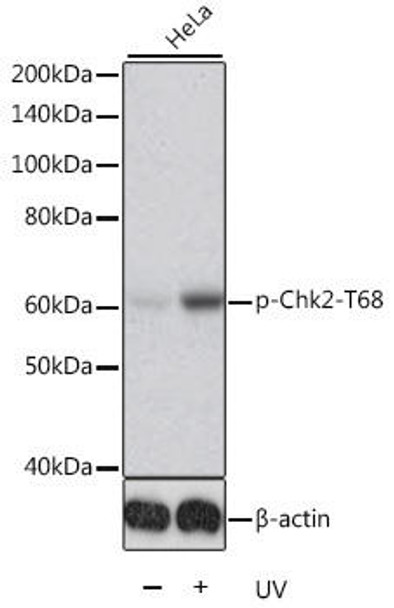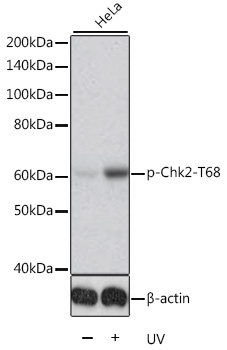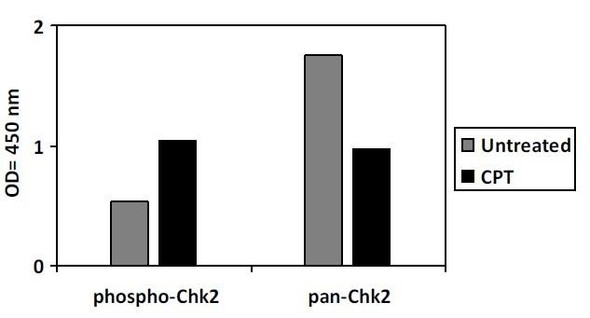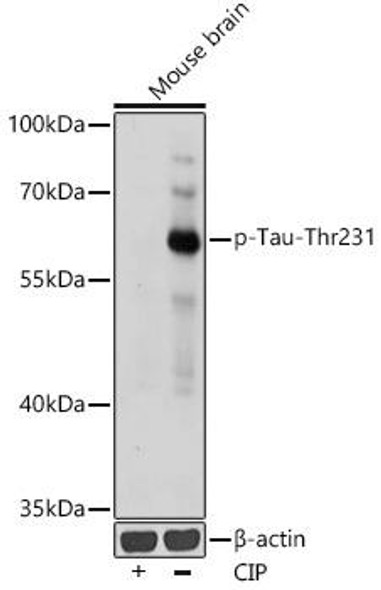Description
Phospho-Chk2-T68 Rabbit Polyclonal Antibody (CABP0590)
The Phospho-Chek2 (T68) Polyclonal Antibody (CABP0590) is a valuable tool for researchers studying the cell cycle checkpoint kinase 2 (Chek2) and its phosphorylation at Threonine 68. Chek2 is a crucial regulator of cell cycle progression and DNA damage response, and phosphorylation at T68 is known to activate its kinase activity.Raised in rabbits, this antibody is highly specific and reactive with human samples, making it ideal for Western blot applications. By binding to the phosphorylated form of Chek2 at T68, researchers can easily detect and analyze the protein in various cell types.
This antibody is essential for studies in cancer research, as Chek2 is frequently mutated or dysregulated in various cancer types.Understanding the role of Chek2 phosphorylation at T68 is essential for deciphering its function in DNA damage response and cell cycle regulation. This antibody provides a powerful tool for investigating the mechanisms underlying Chek2 activation and its implications in cancer development and therapy.
| Product Name: | Phospho-Chk2-T68 Rabbit Polyclonal Antibody |
| SKU: | CABP0590 |
| Size: | 20uL, 100uL |
| Isotype: | IgG |
| Host Species: | Rabbit |
| Reactivity: | Human |
| Immunogen: | A synthetic phosphorylated peptide around T68 of human Chk2 (NP_009125.1). |
| Sequence: | VSTQ E |
| Tested Applications: | WB ELISA |
| Recommended Dilution: | WB,1:500 - 1:2000 |
| Synonyms: | CDS1; CHK2; LFS2; RAD53; hCds1; HuCds1; PP1425; Phospho-Chk2-T68 |
| Positive Sample: | HeLa |
| Conjugate: | Unconjugated |
| Cellular Localization: | Nucleus, Nucleus, PML body, nucleoplasm. |
| Calculated MW: | 61kDa |
| Observed MW: | 62kDa |
In response to DNA damage and replication blocks, cell cycle progression is halted through the control of critical cell cycle regulators. The protein encoded by this gene is a cell cycle checkpoint regulator and putative tumor suppressor. It contains a forkhead-associated protein interaction domain essential for activation in response to DNA damage and is rapidly phosphorylated in response to replication blocks and DNA damage. When activated, the encoded protein is known to inhibit CDC25C phosphatase, preventing entry into mitosis, and has been shown to stabilize the tumor suppressor protein p53, leading to cell cycle arrest in G1. In addition, this protein interacts with and phosphorylates BRCA1, allowing BRCA1 to restore survival after DNA damage. Mutations in this gene have been linked with Li-Fraumeni syndrome, a highly penetrant familial cancer phenotype usually associated with inherited mutations in TP53. Also, mutations in this gene are thought to confer a predisposition to sarcomas, breast cancer, and brain tumors. This nuclear protein is a member of the CDS1 subfamily of serine/threonine protein kinases. Several transcript variants encoding different isoforms have been found for this gene.
| Purification Method: | Affinity purification |
| Gene ID: | 11200 |
| Storage Buffer: | Store at -20℃. Avoid freeze / thaw cycles.Buffer: PBS with 0.02% sodium azide,50% glycerol,pH7.3. |













